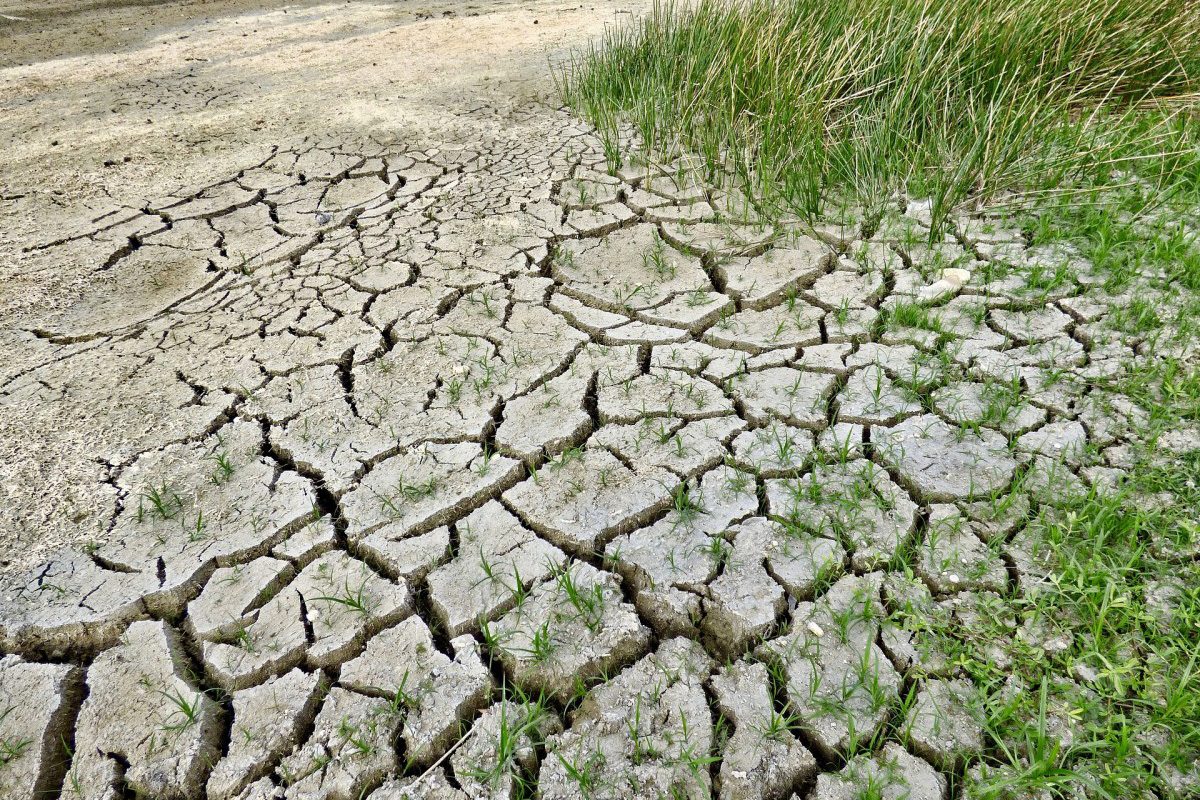
Mud, grey and deeply cracked from drought. // Image from pixabay
Op-ed: Climate change needs emergency response
The following opinion piece from Gerald Heckman, associate professor in the Faculty of Law at the University of Manitoba, was published in the Winnipeg Free Press on July 5.
A CBC poll recently revealed that while two-thirds of Canadians see fighting climate change as a top priority, half of those surveyed “would not shell out more than $100 in taxes” to prevent it. CBC’s polls analyst says the findings point to a population “generally concerned about the heating of the planet but largely unprepared to make significant sacrifices in order to stave off an environmental crisis.”
Few of the Canadians who best understand the meaning of sacrifice are still with us. Weeks ago, on the beaches of Normandy, some of those who remain remembered their comrades who paid the ultimate price to liberate Europe.
Canada, when it entered the Second World War, faced extraordinary peril: the Axis powers pursued world domination and the destruction of democracy through total war. Canadians and their allies faced an existential crisis: only victory over their foes could secure their freedom and that of their children.
Expressing concern about fascism but doing nothing because war would cost too much was not an option. Nor was waiting to enlist until other more powerful countries had joined the war.
Canada’s government spared no effort to achieve victory in the world wars — taxing goods, business profits and personal income and rationing gasoline, building materials and food. Canadians bought victory bonds. From 1939 to 1950, expenditures toward Canada’s war effort approached $22 billion, an astronomical figure.
Beyond these sacrifices at home, between 1939 and 1945, a million Canadians served in the armed services of a nation of only 11 million people. Tens of thousands lost their lives overseas.
On June 17, the House of Commons declared a national climate emergency.
Once again, the threat is existential. By century’s end, we will have doubled levels of heat-trapping atmospheric CO2, bringing unprecedented change to our climate. Warm air carried northwards will bring more heat waves, prolonged drought, a longer forest-fire season and, paradoxically, more frequent and serious flooding.
Rising seas and storm surges from more intense hurricanes will render heavily populated coastal regions increasingly uninhabitable. Higher temperatures and damaging weather events will decrease global agricultural production. One-sixth of the marine life in our warming oceans will disappear by the end of the century.
Melting ice fields and increased evaporation will deprive millions of the fresh water they rely on for drinking water and irrigation. Within a decade, 700,000 more deaths annually are expected from malnutrition, heat stroke, catastrophic weather and ever-spreading tropical infectious diseases attributable to the warming climate.
The current $1.2-trillion annual economic effect from property damage and higher health-care costs and food prices will increase, weakening national economies. So will the risk of global conflict as more people compete for less food, fresh water and habitable land.
The science is unequivocal. Climate change poses an existential threat to Canada and the world. Fossil fuel consumption at current levels accelerates and worsens its effects. Current emission reduction targets yield only a 67 per cent likelihood that warming will remain below the 2 C “dangerous” level.
More aggressive targets are needed. Inaction threatens our children’s and grandchildren’s future. So why are so many Canadians of my generation, the wealthiest in Canada’s history, unprepared to make anything close to the sacrifices that our grandparents made to preserve our future in the face of crisis?
One reason is a failure in political leadership. While the CBC poll asked what people were willing to do individually, climate change is of a scale and character that requires collective, public action. Changing lightbulbs and driving a little less is great, but we need action most at the level of policy.
Manitoba’s government scrapped the timid carbon tax it promised electors, halved its emission-reduction targets and is pursuing legal action to prevent the federal government from putting a price on carbon, undaunted by the failure of similar proceedings before appellate courts in Saskatchewan and Ontario. Fanning the flames of disunity, it has suggested that federal policies motivated by concern for sound environmental stewardship reflect indifference toward Western Canada.
Such actions are irresponsible and reckless, as is the promise of “prosperity for all” from the sustained extraction and export of fossil fuels without acknowledgment that future generations will pay for it many times over through climate change-driven environmental degradation and world insecurity.
Our leaders must gather the courage and moral fortitude they need to level with Canadians. They must tell us that Canada is facing its greatest threat ever, and aggressive action is needed domestically and internationally to reduce fossil-fuel consumption.
They must assure us that, though the effort will require collective sacrifice, they will lead us in the battle of a lifetime to safeguard our children’s and grandchildren’s future.
Then, perhaps, in solemn gatherings that echo this spring’s D-Day celebrations, future generations will remember them, with gratitude, as heroes.







Ignoring the reality that everything we consume, use and require for economic prosperity originates from our natural resources. It must be difficult for other nations to watch Canadians gnaw off our own feet and hands. Thanks, Dr Heckman for highlighting that legal realms acknowledge the urgency. This is no longer just scientific alarm. In the words of Dr Gordon Robinson, many will be dead by the time we see the true effects of climate change. Your children will not. The time is now.